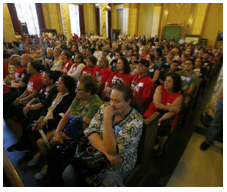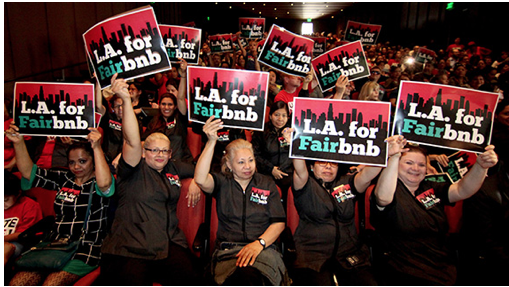CommentsEASTSIDER-The much awaited PLUM Committee meeting to finalize whatever they’re going to do with the Airbnb (Short Term Rental) Ordinance has been shrouded in a veil of secrecy and “moving the ball” hearing dates. Was it because they knew they couldn’t take action at the meeting? You tell me.
At one time tentatively set for October 10, the hearing was rescheduled to Tuesday October 24, although if you were not an insider, you would never have known it. As of 3 p.m. on Friday, there was no posted agenda for the Committee Meeting on the City Council website, and when I contacted the Committee staff, they said the meeting would not be televised -- audio only. Try to identify speakers that way, if you dare.
Host Compliance, LLC - The Data Broker
When the agenda was finally sent out Friday afternoon -- surprise, surprise -- there was a brand new 34-page Planning Department Report Back to the Committee attached.
The data supporting some 12 pages of Department analysis was based on a Los Angeles: Short-Term Rental Market Overview by an outside contractor called Host Compliance, LLC out of San Francisco. All we know about them is that they are a self-proclaimed “software, data and consulting services provider exclusively focused on helping local governments overcome the challenges associated with short-term rentals, and that they base their work on “a set of proprietary data and analytics tools.”
Notwithstanding the pretty graphs for each of the 15 Council Districts, the data itself seems pretty fuzzy. After proclaiming that there are 23,000 STR (short term rental) listings, they go on to say that approximately 15,900 are “entire home” listings, which would be 69% of all short-term rentals.
All these numbers come with big caveats, like “approximately,” “estimates,” and “likely.” My favorite is that the range of unique housing units sued primarily for STRs is “a range of between approximately 6000-10,000 housing units.” And that range itself is based on the contractor’s factoring in a “12.4% duplication rate.”
An interesting observation by the Planning Department in their Report is that, based on data from May 2016 to September 2017, short-term rentals in LA are growing at an annual rate of 34%! That’s an increase of between 1500 to 2500 units just in the last year.
So, in short, while the Report is very data centric, it’s hard to say how reliable the actual details are. There was no information as to who Host Compliance really is, how they got hired, etc., which is important because what we got was a dashboard, as opposed to any underlying data, assumptions, statistical variance and so forth.
Planning Department Report Back Is a Doozy
 Having been burned before by elected officials looking for a priori support notwithstanding reality, the 12 pages of the Planning Department’s Report Back is resplendent with careful language, hedges on most everything, as well as reliance on data provided Host Compliance, LLC.
Having been burned before by elected officials looking for a priori support notwithstanding reality, the 12 pages of the Planning Department’s Report Back is resplendent with careful language, hedges on most everything, as well as reliance on data provided Host Compliance, LLC.
Reading between the lines of the Planning Report, I feel sorry for them. This is a carefully crafted political document and its audience is clearly not all on the same page. Not fun for staff. To their credit, I think they got tired of being used like a pinata by the Committee. So, there was no clear recommendation (except to say that anything over 180 days would likely trigger a CEQA requirement). Instead, we got ranges, estimates, and probabilities. Good for them.
Key points offered were:
- Any elimination of the primary residence requirement would prompt vacation rentals as full-time businesses;
- Knowing that the PLUM Committee won’t follow their recommendation of 90 days, staff point out that anything over 180 days has serious Zoning Code and Building Code implications;
- Staff recommends that the Ordinance keep its cotton pickin’ hands off of RSO stock, recognizing that landlords will switch to STRs in a minute so that they can escape all of the STR restrictions;
- Staff punts on the registration/enforcement process, noting that the City wants to allocate 10% of the TOT fees to administration and enforcement. They also note for the record that these fees will go down from the current amounts when the Ordinance goes into place, since the City currently collects the fee on all STRs, even if they’re rented out 365 days a year;
- Staff also carefully reserved the option for the City to subcontract enforcement to high tech IT companies (maybe Host Compliance?), or use City employees to provide eyes on compliance. One is better, one is cheaper. Guess what the Council will do?
- They also note that there are currently NO enforcement strategies, so the Council can play with a new set of multi-department working groups to find one. Oh goodie.
- Since it is clear that there is no consensus regarding using secondary residences as STRs, staff points out that the Council can do this at the risk of getting hammered with CEQA cases and messing up the zoning and building codes even more than they are now;
- They note that the current Proposed Ordinance gives 90% of the TOT fees to the Affordable Housing Trust Fund, which allegedly helps with affordable housing (pause to laugh here), and further notes that this is in addition to the money which would be generated by the proposed Affordable Housing Linkage Fee. I sure hope that Ron Galperin is ready to do some serious auditing;
- Responding to a question about limiting the number of hosts per neighborhood, staff argues that it might be a good idea (see the clustering of STRs information), but it would be a nightmare to implement;
- In a delicious note, staff points out that currently the City is collecting tax on all of the illegal STRs (since they are all currently illegal), and if the final Ordinance continues to have the 180-day cap, revenues could decrease on the order of 46%. I love it.
The Takeaway
It was no surprise that the PLUM meeting was another standing room only event with an overflow room. It was also clear that Chair Jose Huizar knew that he did not have any unanimity on his Committee, that it would be impossible to take any final actions based on the lack of specific recommendations in the Planning Department’s Report Back document.
So, he punted, and we all get to wait for another day for the PLUM Committee to take any action on the Proposed Ordinance. Big surprise.
Actually, most surprising to me was Council District 12’s Mitchell Englander. He has emerged from asking incomprehensible questions at the last PLUM Committee meeting into the equivalent of a paid staff lobbyist for Airbnb. Really? No limits on the number of days, turning the “short-term” in the STR Ordinance into 365 days/year, allowing vacation rentals, and even going so far as to allow the rental of secondary properties (e.g. -- properties where there is no resident living there).
The only conclusion I can draw is that he saw the relatively paltry listing statistics for his Council District, and is looking for a way to cash in on the STR Ordinance.
In contrast, Blumenthal, and a guest speaker appearance by Koretz (he’s not on the Committee), asked solid questions, and are clearly in favor of reigning in Airbnb the way most other cities have done.
Stay tuned...
(Tony Butka is an Eastside community activist, who has served on a neighborhood council, has a background in government and is a contributor to CityWatch.) Edited for CityWatch by Linda Abrams.
















